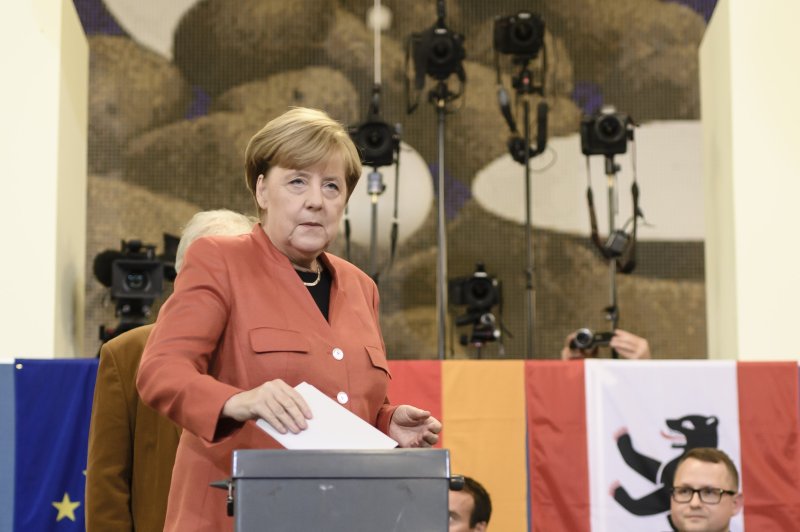German Chancellor Angela Merkel casts her ballot at a polling station in Berlin, Germany, during the federal elections, on September 24, 2017. Her party received the most votes but it took five months to form a coalition government. Photo by Clemens Bilan/EPA
March 4 (UPI) -- German Chancellor Angela Merkel's conservatives have formed a coalition government with the opposition Social Democrats.
Merkel's party, the Christian Social Union, had captured the most votes in national elections five months ago but hadn't been able to reach a coalition, which was necessary to run the government because it wasn't a majority.
Sixty-six percent of the 464,000 rank-and-file members of the Social Democrats party on Saturday agreed to form a coalition. The radical youth wing had opposed the coalition. Voting continued through the night at the party's headquarters in Berlin.
Interim SPD leader Olaf Scholz said: "Now we have clarity. The SPD will enter the next government."
Former SPD Chairman Martin Schulz was forced to resign when he initially ruled out another grand coalition. He later changed his mind and led the yes campaign.
Andrea Nahles is expected to take over as leader of the SPD party in April.
Merkel, who has been in power for 12 years, posted on Facebook "I congratulate the spd on this clear result and look forward to further cooperation for the good of our country."
In reaching a deal, the new finance minister will be a Social Democrat.
In the elections on Sept. 24., Merkel's party had 33 percent of the votes followed by SPD with 20.5 percent, the nationalist Alternative for Germany with 12.6 percent, the liberal Free Democrats with 10.7 percent, the left with 9.2 percent and the Greens with 8.9 percent. Her party had lost 65 seats and failed to form an alliance with the liberal Free Democrats and the Greens.
The AfD, an anti-immigrant party, entered the federal parliament for the first time in September.
"In 2021 at the latest, they'll pay the price," the party tweeted. The message included cartoons of Nahles and Merkel and the caption "four more nightmare years for Germany."
SPD's youth wing leader, Kevin Kuhnert, said he will continue to press for reforms within the party.
"I and many young SPD members are more disappointed by the result than anything else," Kuhnert said. "But this is a democratic decision, and we accept it. We're not sore losers."















